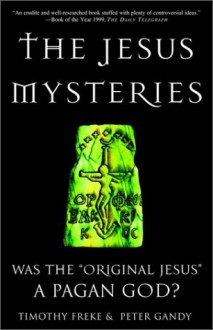
I recently had a look at my review of this book and must admit that I was very disappointed in that I gave it just a brief glance and then threw it on my shelf and forgot about it. I have kept my original review below but after reading the book that I am reading now (Orpheus and Greek Religion) I felt that this particular book requires another look.
Now, the idea that the authors proposed, after thinking about it for a bit and considering the elements of the Greek Mystery religions, the concept of Christianity being a mystery religion isn't something to simply write off. However, the arguments that the authors base their thesis upon is wrong. The reason I say this is because they open their thesis with the argument that Jesus did not exist. Now, granted, my position as a Christian is biased in that regard, but taking that bias out of the equation I still believe there was an historical Jesus. There is just too much evidence supporting his existence, and the author's arguments against this are spurious at best.
However, let us consider the elements of what we know of the mystery religions (remembering that our knowledge of them is limited at best considering that the whole concept of the mystery cult is that outsiders did not know what went on inside, and when Christianity rose to become the dominant religion of Europe, many of the other mystery cults vanished). The main aspect is that they seem to have a focus on a dying and resurrecting God-man. Jesus was not the only figure to die and then come back to life. Others included Orpheus (who descended into hell to rescue his wife), Odysseus (who descended into hell to obtain information on how to return home), Dionysius and Osiris, just to name a few (this was something that scholars refer to as the katabasis or the descent below). The second element is that these religions have an initiation rite: with Christianity that is baptism.
However there are a few differences, one being that with mystery religions the knowledge available to the initiates is not available to those outside of the religion. With Christianity (at least the one that Christ set up) prides itself on its transparency. However, while Christianity desires to propogate itself, and to tell others about the benefits of the religion, there are concepts within Christianity (such as the doctrine of the Trinity and Salvation by Grace) which many of the young adherents simply do no understand, let alone non-believers. Another element is a phrase that I read in my current book, and that that is that 'life is a veil of tears where death is the only release.' That statement is Christianity through and through. The Christian life is a life of suffering as we make our way through to the glory that is awaiting for us beyond death (and this makes me question why Christians simply don't kill themselves, but that is an argument for another time, and is also addressed by many of the ancient writers).
It is true that many of the ancient anti-Christian writers (such as Celsus) point out that Christianity is little more than a mystery cult, and it is interesting that many of the ancient adherents disputed this, though Paul was not necessarily one of them (in which he refers to the mysteries of Christ a few times in his letters). It is also interesting to note that the more fundamentalist a Christian sect becomes then more elements of a mystery cult that it takes on, with baptism always being present as a form of initiation. Now, I'm evangelical Anglican, which means that our take on baptism is that it is a public declaration of our faith in Christ, and while there is nothing magical or mystical about the act, many evangelical Christians will baulk at the idea of being baptised more than once. Once you have been baptised that is it, you do not do it again. Sounds very much like an initiation to me.
Mystery religions actually became quite popular during the Imperial Roman age, where Christianity was not the only 'new' religion that arose. We also had Mithraism and a following of the Egyptian God Isis. However what we need to note is that Christianity survived. It is interesting to note that Constantine, the emperor who made Christianity the state religion of Rome, was a sun worshipper himself (and it is said that Orpheus received his knowledge from Apollo, another Sun god) and was himself very resistant to becoming baptised. However, that is beside the point because the question that I raise is 'why did Christianity take the form of a mystery cult?'.

 Log in with Facebook
Log in with Facebook 






